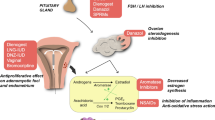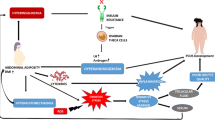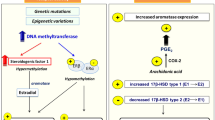Abstract
Purpose
To examine possible effects of endometriosis-related immune events on reproductive function.
Methods
The synthesis and review of the relevant current literature in English language.
Results
The endometriosis-related immune events may have a negative impact on almost all components of the reproductive function including fallopian tube function, oocyte quality, sperm function, fertilization, embryo quality, endometrial receptivity, implantation and placentation.
Conclusions
An important portion of the cases of infertility or miscarriage seen in women with endometriosis may be due to some immunological alterations associated with endometriosis.
Similar content being viewed by others
References
Kim KH, Lee EN, Park JK et al (2012) Curcumin attenuates TNF-α-induced expression of intercellular adhesion molecule-1, vascular cell adhesion molecule-1 and proinflammatory cytokines in human endometriotic stromal cells. Phytother Res 26:1037–1047
Nabeta M, Abe Y, Haraguchi R, Kito K, Kusanagi Y, Ito M (2010) Serum anti-PDIK1L autoantibody as a novel marker for endometriosis. Fertil Steril 94:2552–2557
Nabeta M, Abe Y, Kagawa L et al (2009) Identification of anti-α-enolase autoantibody as a novel serum marker for endometriosis. Proteomics Clin Appl 3:1201–1210
Bohler HC, Gercel-Taylor C, Lessey BA, Taylor DD (2007) Endometriosis markers: immunologic alterations as diagnostic indicators for endometriosis. Reprod Sci 14:595–604
Dias JA Jr, de Oliveira RM, Abrao MS (2006) Antinuclear antibodies and endometriosis. Int J Gynaecol Obstet 93:262–263
Carli C, Metz CN, Al-Abed Y, Naccache PH, Akoum A (2009) Up-regulation of cyclooxygenase-2 expression and prostaglandin E2 production in human endometriotic cells by macrophage migration inhibitory factor: involvement of novel kinase signaling pathways. Endocrinology 150:3128–3137
Veillat V, Carli C, Metz CN, Al-Abed Y, Naccache PH, Akoum A (2010) Macrophage migration inhibitory factor elicits an angiogenic phenotype in human ectopic endometrial cells and triggers the production of major angiogenic factors via CD44, CD74, and MAPK signaling pathways. J Clin Endocrinol Metab 95:403–412
Khoufache K, Michaud N, Harir N, Kibangou Bondza P, Akoum A (2012) Anomalies in the inflammatory response in endometriosis and possible consequences: a review. Minerva Endocrinol 37:75–92
Gupta S, Goldberg JM, Aziz N, Goldberg E, Krajcir N, Agarwal A (2008) Pathogenic mechanisms in endometriosis-associated infertility. Fertil Steril 90:247–257 Review
Matalliotakis IM, Katsikis IK, Panidis DK (2005) Adenomyosis: what is the impact on fertility? Curr Opin Obstet Gynecol 17:261264 Review
Tomassetti C, Meuleman C, Pexsters A et al (2006) Endometriosis, recurrent miscarriage and implantation failure: is there an immunological link? Reprod Biomed Online 13:5864 Review
Iborra A, Palacio JR, UlcovaGallova Z, Martínez P (2000) Autoimmune response in women with endometriosis. Am J Reprod Immunol 44:236241
D’Hooghe TM, Hill JA III (2007) Endometriosis. In: Berek JS (ed) Berek and Novak’s gynecology, 14th edn. Lippincott Williams and Wilkins, Philadelphia, pp 1137–1184
Schenken RS (2008) Endometriosis. In: Gibbs RS, Karlan BY, Haney AF, Nygaard IE (eds) Danforth’s obstetrics and gynecology, 10th edn. Lippincott Williams and Wilkins, Philadelphia, pp 716–724
Kuohung W, Jones GL, Vitonis AF et al (2002) Characteristics of patients with endometriosis in the United States and the United Kingdom. Fertil Steril 78:767–772
Matsuzaki S, Darcha C, Maleysson E, Canis M, Mage G (2010) Impaired downregulation of E cadherin and betacatenin protein expression in endometrial epithelial cells in the midsecretory endometrium of infertile patients with endometriosis. J Clin Endocrinol Metab 95:3437–3445
Yi YC, Wang SC, Chao CC, Su CL, Lee YL, Chen LY (2010) Evaluation of serum autoantibody levels in the diagnosis of ovarian endometrioma. J Clin Lab Anal 24:357–362
Sampson JA (1927) Metastatic or embolic endometriosis, due to the menstrual dissemination of endometrial tissue into the venous circulation. Am J Pathol 3:93–110
Zanatta A, Rocha AM, Carvalho FM et al (2010) The role of the Hoxa10/HOXA10 gene in the etiology of endometriosis and its related infertility: a review. J Assist Reprod Genet 27:701–710
Bulun SE (2009) Endometriosis. N Engl J Med 360:268–279
Bischoff F, Simpson JL (2004) Genetic basis of endometriosis. Ann N Y Acad Sci 1034:284–299 Review
Guo SW (2009) Epigenetics of endometriosis. Mol Hum Reprod 15:587–607 Review
Bulun SE, Zeitoun KM, Kilic G (2000) Expression of dioxinrelated transactivating factors and target genes in human eutopic endometrial and endometriotic tissues. Am J Obstet Gynecol 182:767–775
Simpson JL, Bischoff FZ, Kamat A, Buster JE, Carson SA (2003) Genetics of endometriosis. Obstet Gynecol Clin North Am 30:21–40 Review
Bianco B, André GM, Vilarino FL, Peluso C, Mafra FA, Christofolini CM, Barbosa CP et al (2012) The possible role of genetic variants in autoimmune-related genes in the development of endometriosis. Hum Immunol 73:306–315
Eisenberg VH, Zolti M, Soriano D (2012) Is there an association between autoimmunity and endometriosis? Autoimmun Rev 11:806–814
Zondervan KT, Cardon LR, Kennedy SH (2001) The genetic basis of endometriosis. Curr Opin Obstet Gynecol 13:309–314 Review
Olovsson M (2011) Immunological aspects of endometriosis: an update. Am J Reprod Immunol 66(Suppl 1):101–104
Young SL, Lessey BA (2010) Progesterone function in human endometrium: clinical perspectives. Semin Reprod Med 28:5–16
Herington JL, Bruner-Tran KL, Lucas JA, Osteen KG (2011) Immune interactions in endometriosis. Expert Rev Clin Immunol 7:611–626
Riley CF, Moen MH, Videm V (2007) Inflammatory markers in endometriosis: reduced peritoneal neutrophil response in minimal endometriosis. Acta Obstet Gynecol Scand 86:877–881
Sel’kov SA, Pavlov RV (2007) Comparative efficiency of intraperitoneal interleukin-2 and interferon-A in rats with experimental endometriosis. Bull Exp Biol Med 143:363–367
Christodoulakos G, Augoulea A, Lambrinoudaki I, Sioulas V, Creatsas G (2007) Pathogenesis of endometriosis: the role of defective ‘immunosurveillance’. Eur J Contracept Reprod Health Care 12:194–202
Milewski Ł, Barcz E, Dziunycz P et al (2008) Association of leptin with inflammatory cytokines and lymphocyte subpopulations in peritoneal fluid of patients with endometriosis. J Reprod Immunol 79:111–117
Vinatier D, Dufour P, Oosterlynck D (1996) Immunological aspects of endometriosis. Hum Reprod Update 2:371–384
Hassa H, Tanir HM, Tekin B, Kirilmaz SD, Sahin Mutlu F (2009) Cytokine and immune cell levels in peritoneal fluid and peripheral blood of women with early- and late-staged endometriosis. Arch Gynecol Obstet 279:891–895
Nowak NM, Fischer OM, Gust TC, Fuhrmann U, Habenicht UF, Schmidt A (2008) Intraperitoneal inflammation decreases endometriosis in a mouse model. Hum Reprod 23:2466–2474
Seli E, Arici A (2003) Endometriosis: interaction of immune and endocrine systems. Semin Reprod Med 21:135–144
Sharma I, Dhaliwal LK, Saha SC, Sangwan S, Dhawan V (2010) Role of 8-iso-prostaglandin F2alpha and 25-hydroxycholesterol in the pathophysiology of endometriosis. Fertil Steril 94:63–70
Wu MH, Lu CW, Chuang PC, Tsai SJ (2010) Prostaglandin E2: the master of endometriosis? Exp Biol Med (Maywood) 235:668–677
Liu Y, Hu J, Shen W et al (2011) Peritoneal fluid of patients with endometriosis promotes proliferation of endometrial stromal cells and induces COX-2 expression. Fertil Steril 95:1836–1838
Chuang PC, Lin YJ, Wu MH, Wing LY, Shoji Y, Tsai SJ (2010) Inhibition of CD36-dependent phagocytosis by prostaglandin E2 contributes to the development of endometriosis. Am J Pathol 176:850–860
Lee J, Banu SK, Subbarao T, Starzinski-Powitz A, Arosh JA (2011) Selective inhibition of prostaglandin E2 receptors EP2 and EP4 inhibits invasion of human immortalized endometriotic epithelial and stromal cells through suppression of metalloproteinases. Mol Cell Endocrinol 332:306–313
Lee TC, Ho HC (2011) Effects of prostaglandin E2 and vascular endothelial growth factor on sperm might lead to endometriosis-associated infertility. Fertil Steril 95:360–362
Gazvani R, Templeton A (2002) Peritoneal environment, cytokines and angiogenesis in the pathophysiology of endometriosis. Reproduction 123:217–226 Review
Wu MH, Huang MF, Chang FM, Tsai SJ (2010) Leptin on peritoneal macrophages of patients with endometriosis. Am J Reprod Immunol 63:214–221
Tariverdian N, Theoharides TC, Siedentopf F et al (2007) Neuroendocrine-immune disequilibrium and endometriosis: an interdisciplinary approach. Semin Immunopathol 29:193–210
Berkkanoglu M, Arici A (2003) Immunology and endometriosis. Am J Reprod Immunol 50:48–59
Agic A, Xu H, Finas D, Banz C, Diedrich K, Hornung D (2006) Is endometriosis associated with systemic subclinical inflammation? Gynecol Obstet Invest 62:139–147 Review
Olivares C, Ricci A, Bilotas M, Barañao RI, Meresman G (2011) The inhibitory effect of celecoxib and rosiglitazone on experimental endometriosis. Fertil Steril 96:428–433
Minici F, Tiberi F, Tropea A et al (2007) Paracrine regulation of endometriotic tissue. Gynecol Endocrinol 23:574–580
Bersinger NA, von Roten S, Wunder DM, Raio L, Dreher E, Mueller MD (2006) PAPP-A and osteoprotegerin, together with interleukin-8 and RANTES, are elevated in the peritoneal fluid of women with endometriosis. Am J Obstet Gynecol 195:103–108
Lee KS, Joo BS, Na YJ, Yoon MS, Choi OH, Kim WW (2000) Relationships between concentrations of tumor necrosis factor-alpha and nitric oxide in follicular fluid and oocyte quality. J Assist Reprod Genet 17:222–228
Kondera-Anasz Z, Sikora J, Mielczarek-Palacz A, Jonca M (2005) Concentrations of interleukin (IL)-1alpha, IL-1 soluble receptor type II (IL-1 sRII) and IL-1 receptor antagonist (IL-1 Ra) in the peritoneal fluid and serum of infertile women with endometriosis. Eur J Obstet Gynecol Reprod Biol 123:198–203
Garrido N, Navarro J, Remohi J, Simon C, Pellicer A (2000) Follicular hormonal environment and embryo quality in women with endometriosis. Hum Reprod Update 6:67–74
Punnonen J, Teisala K, Ranta H, Bennett B, Punnonen R (1996) Increased levels of interleukin-6 and interleukin-10 in the peritoneal fluid of patients with endometriosis. Am J Obstet Gynecol 174:1522–1526
Donnez J, Smoes P, Gillerot S, Casanas-Roux F, Nisolle M (1998) Vascular endothelial growth factor (VEGF) in endometriosis. Hum Reprod 13:1686–1690
Navarro J, Garrido N, Remohi J, Pellicer A (2003) How does endometriosis affect infertility? Obstet Gynecol Clin North Am 30:181–192
Martínez-Román S, Balasch J, Creus M et al (1997) Immunological factors in endo me trio sis-associated reproductive failure: studies in fertile and infertile women with and without endometriosis. Hum Reprod 12:1794–1799
Lebovic DI, Mueller MD, Taylor RN (2001) Immunobiology of endometriosis. Fertil Steril 75:1–10
Halis G, Arici A (2004) Endometriosis and inflammation in infertility. Ann N Y Acad Sci 1034:300–315
Pizzo A, Salmeri FM, Ardita FV, Sofo V, Tripepi M, Marsico S (2002) Behaviour of cytokine levels in serum and peritoneal fluid of women with endometriosis. Gynecol Obstet Invest 54:82–87
Pellicer A, Albert C, Mercader A, Bonilla-Musoles F, Remohi J, Simon C (1998) The follicular and endocrine environment in women with endometriosis: local and systemic cytokine production. Fertil Steril 70:425–431
Inagaki J, Kondo A, Lopez LR, Shoenfeld Y, Matsuura E (2005) Pregnancy loss and endometriosis: pathogenic role of anti-laminin-1 autoantibodies. Ann N Y Acad Sci 1051:174–184 Review
Ohman H, Tiitinen A, Halttunen M et al (2009) Cytokine polymorphisms and severity of tubal damage in women with Chlamydia-associated infertility. J Infect Dis 199:1353–1359
Lyons RA, Djahanbakhch O, Saridogan E et al (2002) Peritoneal fluid, endometriosis, and ciliary beat frequency in the human fallopian tube. Lancet 360:1221–1222
Cahill DJ (2002) What is the optimal medical management of infertility and minor endometriosis? Analysis and future prospects. Hum Reprod 17:1135–1140 Review
Barbieri RL, Missmer S (2002) Endometriosis and infertility: a cause-effect relationship? Ann N Y Acad Sci 955:23–33
Pellicer A, Albert C, Garrido N, Navarro J, Remohí J, Simón C (2000) The pathophysiology of endometriosis-associated infertility: follicular environment and embryo quality. J Reprod Fertil Suppl 55:109–119
Gajbhiye R, Suryawanshi A, Khan S et al (2008) Multiple endometrial antigens are targeted in autoimmune endometriosis. Reprod Biomed Online 16:817–824
Barrier BF (2010) Immunology of endometriosis. Clin Obstet Gynecol 53:397–402 Review
Mathur SP (2000) Autoimmunity in endometriosis: relevance to infertility. Am J Reprod Immunol 44:89–95 Review
Fernandéz-Shaw S, Kennedy SH, Hicks BR, Edmonds K, Starkey PM, Barlow DH (1996) Anti-endometrial antibodies in women measured by an enzyme-linked immunosorbent assay. Hum Reprod 11:1180–1184
Kennedy SH, Sargent IL, Starkey PM, Hicks BR, Barlow DH (1990) Localization of anti-endometrial antibody binding in women with endometriosis using a double-labelling immunohistochemical method. Br J Obstet Gynaecol 97:671–674
Sarapik A, Haller-Kikkatalo K, Utt M et al (2010) Serum anti-endometrial antibodies in infertile women—potential risk factor for implantation failure. Am J Reprod Immunol 63:349–357
Kondo A, Inagaki J, Kobayashi K et al (2005) Characterization of a murine anti-laminin-1 monoclonal antibody (AK8) produced by immunization with mouse-derived laminin-1. Clin Dev Immunol 12:67–73
Tunggal P, Smyth N, Paulsson M, Ott MC (2000) Laminins: structure and genetic regulation. Microsc Res Tech 51:214–227
Inagaki J, Sugiura-Ogasawara M, Nomizu M et al (2003) An association of IgG anti-laminin-1 autoantibodies with endometriosis in infertile patients. Hum Reprod 18:544–549
Inagaki J, Kondo A, Lopez LR, Shoenfeld Y, Matsuura E (2004) Anti-laminin-1 autoantibodies, pregnancy loss and endometriosis. Clin Dev Immunol 11:261–266 Review
Inagaki J, Hao L, Nakatsuka M et al (2011) A possible mechanism of autoimmune-mediated infertility in women with endometriosis. Am J Reprod Immunol 66:90–99
Inagaki J, Matsuura E, Nomizu M et al (2001) IgG anti-laminin-1 autoantibody and recurrent miscarriages. Am J Reprod Immunol 45:232–238
Caccavo D, Pellegrino NM, Totaro I, Vacca MP, Selvaggi L, Depalo R (2011) Anti-laminin-1 antibodies in sera and follicular fluid of women with endometriosis undergoing in vitro fertilization. Int J Immunopathol Pharmacol 24:481–488
Dmowski WP, Rana N, Michalowska J, Friberg J, Papierniak C, el-Roeiy A (1995) The effect of endometriosis, its stage and activity, and of autoantibodies on in vitro fertilization and embryo transfer success rates. Fertil Steril 63:555–562
Horejsí J, Martínek J, Nováková D, Madar J, Brandejska M (2000) Autoimmune antiovarian antibodies and their impact on the success of an IVF/ET program. Ann N Y Acad Sci 900:351–356
Gleicher N, el-Roeiy A, Confino E et al (1987) Is endometriosis an autoimmune disease? Obstet Gynecol 70:115–122
Gleicher N, el-Roeiy A, Confino E et al (1989) Reproductive failure because of autoantibodies: unexplained infertility and pregnancy wastage. Am J Obstet Gynecol 160:1376–1380
Kaider AS, Kaider BD, Janowicz PB, Roussev RG (1999) Immunodiagnostic evaluation in women with reproductive failure. Am J Reprod Immunol 42:335–346
Cline AM, Kutteh WH (2009) Is there a role of autoimmunity in implantation failure after in vitro fertilization? Curr Opin Obstet Gynecol 21:291–295
Mathur SP, Lee JH, Jiang H et al (1999) Levels of transferrin and alpha 2-MS glycoprotein in women with and without endometriosis. Autoimmunity 29:121–127
Bondza PK, Maheux R, Akoum A (2009) Insights into endometriosis-associated endometrial dysfunctions: a review. Front Biosci (Elite Ed) 1:415–428 Review
Giudice LC, Telles TL, Lobo S, Kao L (2002) The molecular basis for implantation failure in endometriosis. Ann N Y Acad Sci 955:25–64
Khorram O, Lessey BA (2002) Alterations in expression of endometrial endothelial nitric oxide synthase and alpha(v)beta(3) integrin in women with endometriosis. Fertil Steril 78:860–864
Koot YE, Teklenburg G, Salker MS, Brosens JJ, Macklon NS (2012) Molecular aspects of implantation failure. Biochim Biophys Acta 1822:1943–1950
Casals G, Ordi J, Creus M et al (2012) Expression pattern of osteopontin and αvβ3 integrin during the implantation window in infertile patients with early stages of endometriosis. Hum Reprod 27:805–813
Lessey BA (2002) Implantation defects in infertile women with endometriosis. Ann N Y Acad Sci 955:265–280
Lessey BA, Damjanovich L, Coutifaris C et al (1992) Integrin adhesion molecules in the human endometrium. Correlation with the normal and abnormal menstrual cycle. J Clin Invest 90:188–195
Donaghay M, Lessey BA (2007) Uterine receptivity: alterations associated with benign gynecological disease. Semin Reprod Med 25:461–475
Noble LS, Takayama K, Zeitoun KM et al (1997) Prostaglandin E2 stimulates aromatase expression in endometriosis-derived stromal cells. J Clin Endocrinol Metab 82:600–606
Zeitoun KM, Bulun SE (1999) Aromatase: a key molecule in the pathophysiology of endometriosis and a therapeutic target. Fertil Steril 72:961–969
Banerjee P, Jana SK, Pasricha P, Ghosh S, Chakravarty B, Chaudhury K (2012) Proinflammatory cytokines induced altered expression of cyclooxygenase-2 gene results in unreceptive endometrium in women with idiopathic recurrent spontaneous miscarriage. Fertil Steril doi:10.1016/s0015-0282(12)02122-X
Revel A (2012) Defective endometrial receptivity. Fertil Steril 97:1028–1032 Review
Saito H, Seino T, Kaneko T, Nakahara K, Toya M, Kurachi H (2002) Endometriosis and oocyte quality. Gynecol Obstet Invest 53(Suppl 1):46–51
Van Langendonckt A, Casanas-Roux F, Donnez J (2002) Oxidative stress and peritoneal endometriosis. Fertil Steril 77:861–870
Szczepanska M, Kozlik J, Skrzypczak J, Mikolajczyk M (2003) Oxidative stress may be a piece in the endometriosis puzzle. Fertil Steril 79:1288–1293
Harlow CR, Cahill DJ, Maile LA et al (1996) Reduced preovulatory granulosa cell steroidogenesis in women with endometriosis. J Clin Endocrinol Metab 81:426–429
Cahill DJ, Hull MGR (2000) Pituitary ovarian dysfunction and endometriosis. Hum Reprod Update 6:56–66
Cahill DJ, Wardle PG, Maile LA, Harlow CR, Hull MG (1997) Ovarian dysfunction in endometriosis-associated and unexplained infertility. J Assist Reprod Genet 14:554–557
Bulun SE, Cheng YH, Pavone ME et al (2010) Estrogen receptor-beta, estrogen receptor-alpha, and progesterone resistance in endometriosis. Semin Reprod Med 28:36–43
Fazleabas AT (2010) Progesterone resistance in a baboon model of endometriosis. Semin Reprod Med 28:75–80
Kawano Y, Nasu K, Li H et al (2011) Application of the histone deacetylase inhibitors for the treatment of endometriosis: histone modifications as pathogenesis and novel therapeutic target. Hum Reprod 26:2486–2498
Conflict of interest
None.
Author information
Authors and Affiliations
Corresponding author
Rights and permissions
About this article
Cite this article
Kokcu, A. Possible effects of endometriosis-related immune events on reproductive function. Arch Gynecol Obstet 287, 1225–1233 (2013). https://doi.org/10.1007/s00404-013-2767-2
Received:
Accepted:
Published:
Issue Date:
DOI: https://doi.org/10.1007/s00404-013-2767-2




